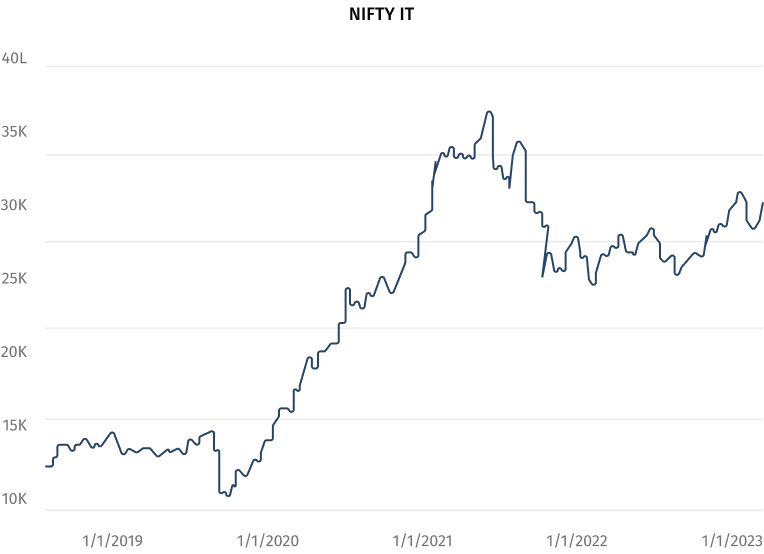1 Finance Magazine
Your trusted source for unbiased and holistic personal finance research
© 2024, Inc. All rights reserved.

When it comes to investing in mutual funds, newbie investors overlook many factors and focus just on the returns of the recent past, say one to three years.
But is this the right approach?
We did a study to analyse how the top performing mutual funds of a particular 3-year period performed in the subsequent years.
Our study covered the performance of direct growth equity mutual funds schemes’ for every three year period starting in 2014. Each fund's ranking in a particular period, say 2014-16 was compared with its performance in the next three year period, i.e., 2017-19, in this case.
We did not cover index funds and ETFs for our study of ranking these funds. Returns until November 30, 2023, are considered for data for the year 2023.
Our study found that there’s no direct correlation between a fund’s performance that ranks the best in the first three years and its subsequent years. Top performing mutual funds in a particular period might not even rank within the top 100 performing funds (in terms of absolute returns) in the subsequent three-year period.
The findings of our study are as follows:
It can be inferred that if a particular fund has performed well in the past, it is not necessary that it will also perform as the best fund in the subsequent periods as well.
The top performer in the years 2014-16 ranked 198th in the years 2017-19.
A fund might shoot to the top when there's a boom in a specific industry or theme (say, real estate or information technology), but these thematic rallies often do not last long.
A recent case in point is the rally in information technology (IT) stocks. The Nifty IT Index rallied and delivered an annualised return of 38.94% from 2019-2021. However, since December 31, 2021, closing, the Nifty IT index fell 15.81% until November 30, 2023.

The thing is, markets are dynamic, and economic conditions change. A fund that excelled during a particular sectoral or thematic rally might struggle when conditions shift.
Moreover, what truly stands the test of time is consistency.
Funds that can deliver steady performance across different market conditions tend to fare better over the long run. When we talk about the consistency of a mutual fund, we're looking for a fund that doesn't just shine brightly during market booms but also weathers the storms during downturns.
It's about maintaining a balanced performance throughout different economic cycles, whether they're characterised by growth, stability, or decline.
1 Finance has given a score to each fund that takes into account a lot of factors, which we will discuss later on in this article. Let’s take a look at the top 5 funds as per their scoring and ranking model and their annual returns over a 10-year period:
| Name of the Fund | Annualised returns in the last 10-year period* | 1 Finance Score |
|---|---|---|
| Kotak Emerging Equity Fund (G) - Direct Plan | 24.82% | 100 |
| Mirae Asset Emerging Bluechip (G) - Direct Plan | 24.25% | 100 |
| Parag Parikh Flexi Cap Fund (G) - Direct Plan | 20.32% | 99 |
| ICICI Pru Value Discovery Fund (G) - Direct Plan | 20.31% | 98 |
*Scoring as of September 30, 2023 and returns data as on 8th December, 2023
Were these the top performing funds every year? No!
Kotak Emerging Equity Fund was ranked 8th in the years 2014-16 and it also ranked 92nd in the years 2017-19.
Mirae Asset Emerging Bluechip Fund was among the top 10 funds from 2013 - 2019, but it ranked 154th in the years 2021-23.
But still, these funds perform well in the long-run. This is because we study for high consistency in our period under evaluation.
It is based on the following parameters:
Sharpe Ratio;
Sortino Ratio;
Treynor Ratio;
Jensen’s Alpha and
Fund Manager’s performance.
After a score has been obtained by allocating proprietary weights to these factors, all the funds are ranked based on their score.
These detailed evaluations thus help in selecting the mutual funds that may generate superior (not the best) returns in the years to come, as they have exhibited good risk management skills while delivering returns.
More on these ratios is in the features list section of our magazine.
Chasing the best incumbents solely on the basis of returns may not work in the future. That is because a strategy that has worked in the past may not work in the coming years. Our research shows that top performing funds may not weather the storm in subsequent years when the tide changes against their strategies.
Thus, it is best suited for an investor to do a detailed analysis of mutual funds on various parameters (and not just returns) while selecting them for their respective portfolios.
However, the selection of funds for one’s portfolio should be based on their financial risk profiling and a detailed, personalised assessment of goals and objectives.
Table of Contents
Share: